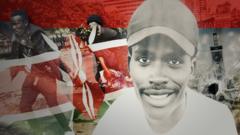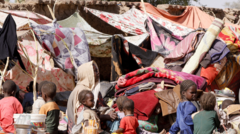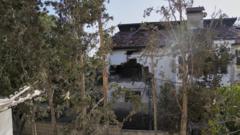As conflict continues in Gaza, an alarming number of protests are asserting that the population no longer supports Hamas. Citizens attribute their suffering to the group's governance and are increasingly vocal despite the risks of retaliation.
Rising Resistance: Gaza Citizens Challenge Hamas Authority Amidst Ongoing Conflict

Rising Resistance: Gaza Citizens Challenge Hamas Authority Amidst Ongoing Conflict
Protests against Hamas are emerging as Gaza's residents voice their frustrations, revealing a shift in public sentiment as the group faces increasing dissent.
The streets of Gaza are echoing with calls for change as protests against Hamas proliferate, signaling a potential shift in the power dynamics that have characterized the region for over two decades. Citizens, grappling with the devastation and hardship of ongoing violence, are publicly blaming Hamas for their dire situation, demanding an end to the group's rule.
"Out! Out! Out!" is a call resonating through various neighborhoods, as demonstrators voice their frustration with increasing audacity. Many Gazans have taken to social media and the streets to express their discontent, with slogans like "Hamas is garbage" capturing the sentiment of a populace long stifled by fear of retribution.
Moumen al-Natour, a prominent lawyer and former organizer within Gaza, articulates this burgeoning resistance, attributing the worsening of living conditions to Hamas' governance. "We didn't choose Hamas," he claims, highlighting a pervasive sentiment that the group's continued leadership is unsustainable. During an April protest in Beit Lahiya, such sentiments transformed into collective chants against the group, reflecting an unmistakably shifted public narrative.
Retaliation by Hamas against dissenting voices has been severe. The recent death of Oday al-Rubai, a young man who participated in anti-Hamas demonstrations, has only intensified scrutiny and outcry toward the organization's violent tactics. His mysterious and brutal demise has led to accusations against Hamas of egregious human rights violations.
The risk of speaking out remains daunting. Others, like Amin Abed—a vocal critic who endured a brutal assault from Hamas militants—have sought refuge abroad, yet remain connected to the protest movement against the group's oppressive tactics. Abed asserts that despite mounting risks, the tide is turning, as citizens exhibit newfound bravery against their former rulers.
Increasing incidents of civilian resistance are reported, as locals push back against Hamas' attempts to utilize their neighborhoods for military operations. Eyewitness accounts illustrate courageous confrontations that defy the group's prior grip on power, showcasing a community tired of suffering and conflict.
As Gaza suffers from relentless bombardment, protests indicate that residents are reevaluating their fear of Hamas. They are now vocal in their criticism of both Hamas and the ongoing Israeli assaults. While these protests have not yet escalated into a full-scale rebellion, the consecutive waves of dissent suggest that Hamas' grip on power might be weakening, as the yearning for autonomy grows louder among the people of Gaza.


















